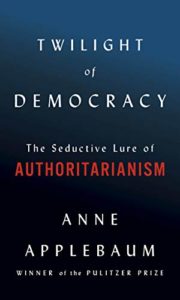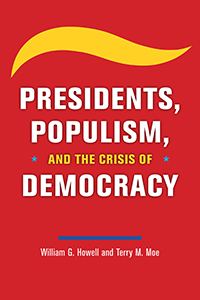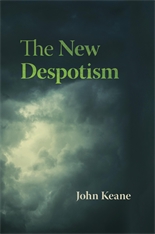
Some voters live in a so-called populist bubble, where they hear nationalist and xenophobic messages, learn to distrust fact-based media and evidence-based science, and become receptive to conspiracy theories and suspicious of democratic institutions. But a democratic counter-narrative can burst the bubble, notes analyst Anne Applebaum.
In an effort to challenge the populist-nationalist Swiss People’s Party, a group called Operation Libero (above) promoted a more welcoming vision of the nation, noting that modern Switzerland’s founding moment was the liberal revolution of 1848, that the country had a long history of religious tolerance and openness to the world, she writes for The Atlantic:
Calling themselves the “children of 1848,” Operation Libero started making amusing video clips—an animated cartoon of Helvetia, the national symbol, howling as she is knocked over by a populist wrecking ball—and memes. The group created teams of volunteers who would argue against the Swiss version of the online alt-right, and invited the populists to engage in debate. It worked: Not only did Operation Libero help its own side prevail in several referendum campaigns, but its members looked like they were having fun doing it.
 However, the reactionary turn among some of Applebaum’s Polish friends described in her book, Twilight of Democracy, doesn’t mean that Poles have rejected liberal democracy, argues John Lloyd, a contributing editor to the Financial Times and co-founder of Oxford University’s Reuters Institute for the Study of Journalism. Indeed, in the presidential election in July, the incumbent Andrzej Duda barely scraped a victory over Warsaw mayor Rafał Trzaskowski by 51 to 49 percent on the second ballot—and this was with state media working overtime on Duda’s behalf, he writes for Quillette:
However, the reactionary turn among some of Applebaum’s Polish friends described in her book, Twilight of Democracy, doesn’t mean that Poles have rejected liberal democracy, argues John Lloyd, a contributing editor to the Financial Times and co-founder of Oxford University’s Reuters Institute for the Study of Journalism. Indeed, in the presidential election in July, the incumbent Andrzej Duda barely scraped a victory over Warsaw mayor Rafał Trzaskowski by 51 to 49 percent on the second ballot—and this was with state media working overtime on Duda’s behalf, he writes for Quillette:
Trzaskowski … comes from a well-known musical family, was educated in Oxford and Paris and elected to the European Parliament. Last year, he signed a declaration in support of the Polish LGBT community. In other words, he is exactly the kind of cosmopolitan liberal Law and Justice love to hate, but who many Poles stubbornly seem to like. When Poland broke with communism 30 years ago, for a public figure to support homosexual rights would have been bizarre. The country has come a long way down a civil path since then.
The United States is facing a historic crisis that fundamentally threatens its democratic system of government, according to Stanford political scientist Terry Moe. The principal comes from long brewing forces, including globalization, automation and immigration, which have created economic disruptions and cultural anxieties for millions, Stanford’s Sandra Feder writes.
 “The nation has entered a treacherous new era in its history, one that threatens the system of self-government that for more than two hundred years has defined who we are as a country and as a people,” write Moe, the William Bennett Munro Professor in Political Science in the School of Humanities and Sciences, and William Howell, the Sydney Stein Professor in American Politics at the University of Chicago, in a new book, Presidents, Populism, and the Crisis of Democracy (University of Chicago Press).
“The nation has entered a treacherous new era in its history, one that threatens the system of self-government that for more than two hundred years has defined who we are as a country and as a people,” write Moe, the William Bennett Munro Professor in Political Science in the School of Humanities and Sciences, and William Howell, the Sydney Stein Professor in American Politics at the University of Chicago, in a new book, Presidents, Populism, and the Crisis of Democracy (University of Chicago Press).
“Our government has done a very ineffective job of dealing with these problems and the result has been a rising surge of populist anger,” Moe told Feder:
Saving our democracy, the scholars write, will require major changes that go beyond November’s election. The real challenge, they contend, is to enact programs and institutional reforms that can provide us with a genuinely effective government – one that is capable of dealing with the problems of modernity and defusing the populist threat. Until that challenge is met, they say, reformers cannot rest.
“The fact is, no matter which party holds the presidency, these are not normal times,” the authors write. “And a sense of normalcy, should it take hold with the election of a new president, stands to be little more than an exercise in denial, offering temporary relief from the recent populist turmoil but leaving the causes of that turmoil unaddressed and the potential for continued democratic backsliding firmly in place.”
 The assumption that a less conflictual and partisan politics would deprive populism of oxygen—and, therefore, that an expanded role for experts would be a silver lining to the COVID-19 tragedy—rests upon the unfounded assumption that populists benefit from a pluralism of ideas and parties, says analyst Nadia Urbinati, author of Me the People: How Populist Renaissance Transforms Democracy. In actuality, populists rise to power by campaigning against party politics, which they claim fragments the unity of the “true” people and weakens its sovereign power, she writes for Foreign Affairs:
The assumption that a less conflictual and partisan politics would deprive populism of oxygen—and, therefore, that an expanded role for experts would be a silver lining to the COVID-19 tragedy—rests upon the unfounded assumption that populists benefit from a pluralism of ideas and parties, says analyst Nadia Urbinati, author of Me the People: How Populist Renaissance Transforms Democracy. In actuality, populists rise to power by campaigning against party politics, which they claim fragments the unity of the “true” people and weakens its sovereign power, she writes for Foreign Affairs:
That populists are skeptical of experts should not occlude the fact that party democracy tolerates partisan politics far better than does populist democracy. To the extent that empowering scientific experts constricts the realm of partisan contestation, then, it is unlikely to deflate populism’s demagogic appeal. Rather, populists will campaign against unfriendly experts and draw strength from this new grievance….
Social democratic parties (where they still exist) will have to shake themselves awake and start mobilizing citizens around social justice and redistribution—otherwise populism could have a bright future, Urbinati concludes.
National Endowment for Democracy (NED) board member Applebaum’s new book, Twilight of Democracy, describes how her former friends and colleagues became agents of populism, Francis Beckett writes for The European.
 Scholars have analyzed threats to democracy from various angles, he writes for The Post:
Scholars have analyzed threats to democracy from various angles, he writes for The Post:
Princeton political scientist Jan-Werner Müller has argued that populism, often presented as an appeal to the broad interests of the people, in fact rejects pluralism and veers toward authoritarianism that excludes people deemed unacceptable. In his latest book, “The New Despotism” (above), John Keane, a professor at the University of Sydney, takes aim at the political tools that modern authoritarians have mastered to assert power.







